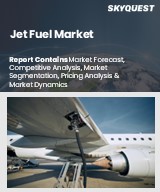
Report ID: SQMIG10C2049
Skyquest Technology's expert advisors have carried out comprehensive research on the jet fuel market to identify the major global and regional market trends and growth opportunities for leading players and new entrants in this market. The analysis is based on in-depth primary and secondary research to understand the major market drivers and restraints shaping the future development and growth of the industry.
Increasing Demand for Air Travel
Advancements in Aviation Technology
Fluctuating Crude Oil Prices
Regulatory Pressures on Emissions
REQUEST FOR SAMPLE
Global Jet Fuel Market size was valued at USD 284.58 Billion in 2023 and is poised to grow from USD 297.87 Billion in 2024 to USD 429.15 Billion by 2032, growing at a CAGR of 4.67% in the forecast period (2025-2032).
The competitive landscape of the global jet fuel industry is currently undergoing a significant transformation, primarily driven by the urgent need for decarbonization and the emergence of sustainable aviation fuels (SAF). Traditional oil and gas giants, such as ExxonMobil, Chevron, BP, Shell, and TotalEnergies, are major players with established infrastructure for production, distribution, and supply of conventional jet fuel. 'LanzaJet', 'International Airlines Group (IAG)', 'Honeywell ', 'ExxonMobil', 'Chevron', 'BP p.l.c.', 'Shell', 'TotalEnergies', 'Neste', 'World Energy, LLC', 'Gevo, Inc.', 'Aemetis, Inc.', 'Fulcrum BioEnergy', 'SkyNRG'
The growing global demand for air travel is a key driver for the jet fuel market. This demand has been further accelerated by the expansion of low-cost carriers and increasing disposable incomes in emerging markets, particularly in Asia Pacific. As the volume of flights increases, airlines require more jet fuel to meet the operational needs of their fleets, thereby driving the growth of the jet fuel market.
Growth in Sustainable Aviation Fuel (SAF): Sustainable aviation fuel (SAF) is emerging as one of the most significant global jet fuel market trend in the jet fuel market. SAF is produced from renewable resources like biofuels, waste oils, or even algae, offering a more sustainable alternative to conventional jet fuel. The adoption of SAF is gaining momentum as airlines and airports worldwide commit to carbon-neutral targets. SAF not only helps reduce the aviation industry's environmental impact but also aligns with regulatory requirements regarding emissions. Major airlines and energy companies are investing heavily in SAF production and partnerships to meet sustainability goals.
What are the Key Factors Driving the Jet Fuel Market in North America?
Want to customize this report? This report can be personalized according to your needs. Our analysts and industry experts will work directly with you to understand your requirements and provide you with customized data in a short amount of time. We offer $1000 worth of FREE customization at the time of purchase.
Feedback From Our Clients

Report ID: SQMIG10C2049
sales@skyquestt.com
USA +1 351-333-4748